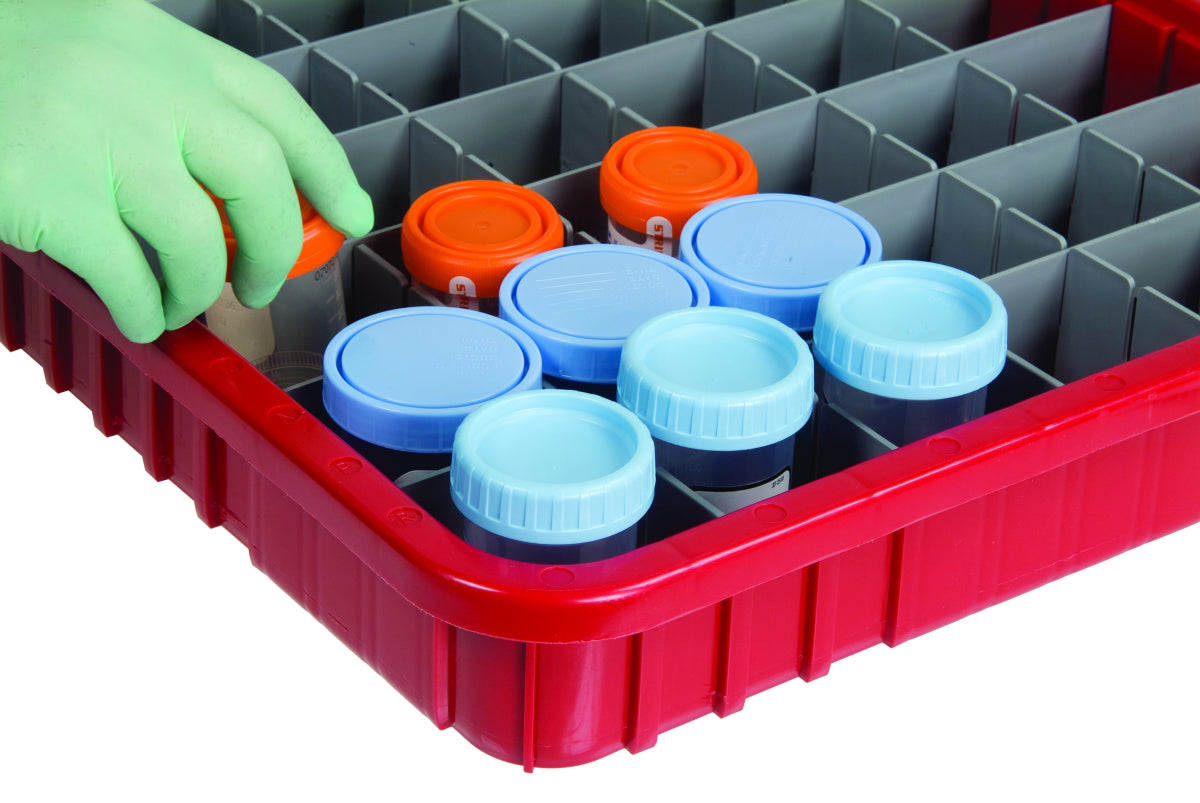Maximizing Safety and Efficiency: The Essential Role of Plastic Dividable Grid Containers in Liquid and Chemical Industries
Handling liquids and chemicals poses significant storage and transportation challenges for a variety of industries. Storage and transportation solutions must ensure efficiency, safety, and regulatory compliance. Plastic dividable grid containers provide an effective solution for these needs.
These containers, often referred to as divider boxes, are crucial in managing a wide range of substances — from pharmaceuticals and food ingredients to industrial chemicals. Their unique design, featuring customizable compartments and robust construction, makes them a valuable tool across various sectors. This article explains more about plastic dividable grid containers, exploring their applications, benefits, and the critical role they play for companies in the manufacturing and assembly sector. We'll examine how divider boxes not only streamline operations but also significantly enhance safety protocols and regulatory compliance, making them a key component in the operational toolkit of these industries.
Understanding Plastic Dividable Grid Containers
Design and Features: Plastic dividable grid containers, known for versatility and durability, are perfect or industries handling liquids and chemicals. Made from high-density polypropylene, these customizable containers resist a wide range of chemical agents and withstand significant wear and tear.
The key feature of these containers is their dividable grid system. This system allows for the creation of customizable compartments within the container, which can be adjusted to accommodate various items such as bottles, vials, or even larger canisters.
Benefits:
Durability and Chemical Resistance: Made from high-density polypropylene, these divider boxes offer longevity, durability, and resistance to corrosive substances, ensuring safe storage of various chemicals.
Customization: The ability to create custom compartment sizes means that these containers can be tailored for any unique storage requirements. This flexibility is vital in industries where space optimization and efficient organization of different products are essential.
Safety Features: Dividable grid containers offer optional snap-on covers that secure the contents, protecting the contents from dust, spills or accidental exposure to hazardous materials.
Ease of Handling and Transportation: Easy to carry and designed for stacking, grid containers simplify the handling and transportation of hazardous materials, making them ideal for use in warehouses, laboratories, and production facilities.
Plastic dividable grid containers offer a combination of durability, customization, and safety that is perfectly suited to the demands of industries dealing with liquids and chemicals. Their design not only enhances efficiency and organization but also plays a crucial role in ensuring safety and regulatory compliance.
Applications in the Pharmaceutical Industry
The pharmaceutical industry, with its stringent requirements for precision and safety, finds an ideal solution in plastic dividable grid containers for managing its diverse range of products and materials. Well-known companies like Pfizer, Merck, and Johnson & Johnson, which are at the forefront of drug development and manufacturing, utilize these containers for various purposes.
Storage of Raw Materials and Compounds: At the initial stages of drug development and production, companies like Pfizer handle a multitude of raw materials and chemical compounds. Dividable grid containers allow for the orderly storage of these materials, segregating them to prevent cross-contamination, a critical consideration in pharmaceutical manufacturing.
Organizing Clinical Trial Materials: Companies such as Merck, involved in extensive clinical trials, require meticulous organization of trial materials. These containers provide a systematic way to store and transport these materials, ensuring that they remain uncontaminated and readily identifiable, which is crucial for maintaining the integrity of the trials.
Handling of Finished Products: For Johnson & Johnson, and similar companies, ensuring the safe handling of finished products like tablets, capsules, and vaccines is paramount. Dividable grid containers, with their customizable compartments, offer a secure way to store and transport these products, especially when dealing with multiple types of medications or doses.
Compliance with Health Regulations: The pharmaceutical industry is governed by stringent health and safety regulations, including those set by the FDA in the United States. These containers help companies adhere to these regulations by providing a storage solution that protects against contamination and ensures the integrity of pharmaceutical products.
Preventing Contamination: In pharmaceutical labs and manufacturing facilities, preventing contamination is critical. The design of these containers, often featuring secure lids and smooth, easily cleanable surfaces, helps in maintaining a sterile environment, essential for the safety and efficacy of pharmaceutical products.
Facilitating Distribution and Logistics: The ease of handling and transportation offered by these containers streamlines the distribution process for pharmaceutical companies. This is particularly beneficial for global companies like Pfizer and Johnson & Johnson, which distribute products worldwide, requiring efficient and secure logistics solutions.
For giants in the pharmaceutical industry, plastic dividable grid containers are not just storage units; they are vital tools that ensure efficiency, safety, and compliance with regulatory standards. Their customizable and protective features make them indispensable in the complex and highly regulated world of pharmaceutical manufacturing and distribution.
Use in Chemical Manufacturing
In the realm of chemical manufacturing, where the handling of potentially hazardous substances is a daily routine, the need for secure and reliable storage solutions is paramount. Companies like BASF, Dow Chemical, and DuPont, leaders in the chemical industry, rely heavily on plastic dividable grid containers to navigate the challenges of storing and transporting chemical components.
Storing a Variety of Chemicals: Chemical giants such as BASF deal with a wide range of chemicals, from basic raw materials to complex compounds. The customizable nature of dividable grid containers allows for the safe segregation of different chemicals, minimizing the risk of cross-contamination and chemical reactions, which can be hazardous.
Transportation and Handling: For companies like Dow Chemical, the transportation of chemical components between different stages of production or to end-users is a critical operation. These containers, designed for durability and ease of handling, ensure that chemicals are transported safely, reducing the risk of spills or exposure.
Resistance to Chemicals: A key feature of these containers is their resistance to a wide array of chemical substances. Companies like DuPont require containers that can withstand corrosive materials without degrading. The materials used in these dividable grid containers, such as high-density polyethylene, are chosen for their inert properties, ensuring long-term durability even in harsh chemical environments.
Compliance with Safety Standards: The chemical industry is subject to stringent safety regulations, including proper storage and handling of hazardous materials. By using these specialized containers, companies can adhere to these regulations, ensuring a safe working environment and avoiding potential legal complications.
Enhancing Efficiency in Production: The organized storage provided by these containers streamlines the production process. Workers can quickly locate and access the needed chemicals, which is essential in a fast-paced manufacturing environment. This efficiency is crucial for companies like BASF and Dow Chemical, where time and accuracy are critical factors.
Preventing Environmental Contamination: Beyond safety within the facilities, these containers play a significant role in preventing environmental contamination. By securely containing chemicals, they reduce the risk of accidental releases, aligning with the environmental responsibilities and sustainability goals of companies like DuPont.
For chemical manufacturing behemoths, the use of plastic dividable grid containers is a matter of efficiency, safety, and regulatory compliance. Their robust design and customizable features make them an essential component in the safe handling, storage, and transportation of chemical products.
Adoption in the Food and Beverage Industry
In the food and beverage industry, where the integrity and safety of products are of utmost importance, the use of plastic dividable grid containers has become increasingly prevalent. Major players like Nestlé, Coca-Cola, and PepsiCo utilize these containers for various purposes, from ingredient storage to product distribution.
Storing Ingredients and Additives: Companies such as Nestlé, renowned for a wide range of food products, rely on dividable grid containers to store various ingredients, including flavorings, colorings, and preservatives. The ability to customize compartments within these containers allows for the organized and separate storage of different ingredients, reducing the risk of cross-contamination – a critical factor in food safety.
Efficient Production Line Management: For beverage giants like Coca-Cola and PepsiCo, managing the production line efficiently is key to maintaining high output levels. These containers facilitate the organization of components and ingredients along the production line, streamlining the process and enhancing overall productivity.
Compliance with Food Safety Standards: The food and beverage industry is governed by strict food safety regulations, such as those set by the FDA and international bodies. The non-reactive nature of the materials used in dividable grid containers ensures that they do not contaminate food products, helping companies like Nestlé and PepsiCo maintain compliance with these standards.
Protection Against Contamination: Ensuring products are free from contamination is paramount in the food and beverage industry. The secure lids and durable construction of these containers protect ingredients and finished products from environmental contaminants, preserving their quality and safety.
Facilitating Transport and Logistics: The robust design of these containers, coupled with their stackable nature, makes them ideal for transporting food and beverage products. This is particularly beneficial for companies like Coca-Cola, which distribute products globally, requiring reliable and efficient logistics solutions.
Customization for Specific Needs: The food and beverage industry has diverse storage requirements, varying from dry ingredients to liquid flavorings. Dividable grid containers can be customized with specialized liners or coatings, making them suitable for a wide range of substances and ensuring that companies like Nestlé can use them for multiple purposes.
In conclusion, the adoption of plastic dividable grid containers in the food and beverage industry highlights their versatility and effectiveness in meeting the unique storage and handling needs of this sector. From ensuring food safety to optimizing production lines, these containers play a critical role in the operations of industry leaders.
Safety and Compliance
In industries handling hazardous liquids and chemicals, safety and compliance are not just best practices; they are imperative. Plastic dividable grid containers are instrumental in ensuring both. Their design and material composition cater specifically to the stringent safety protocols and regulatory standards these industries must adhere to.
Enhanced Safety Measures: The sturdy construction and customizable compartments of these containers significantly reduce the risk of spills and accidental exposures. For workers handling dangerous substances, this means a safer working environment. The containers' secure locking mechanisms further prevent unauthorized access, an essential safety feature in environments dealing with hazardous materials.
Regulatory Compliance: Industries like pharmaceuticals, chemicals, and food and beverages are governed by a myriad of regulations, including those set by OSHA, FDA, and EPA. The use of these containers aids in compliance, as they are often designed to meet specific industry standards for storage and handling. For instance, containers used in the food industry are typically made from FDA-approved materials, ensuring they are safe for food contact.
Environmental Protection: Beyond safeguarding human health, these containers play a role in environmental conservation. By securely containing hazardous materials, they prevent accidental leaks and spills, which can have detrimental effects on the environment.
In summary, the adoption of plastic dividable grid containers in these sectors is a testament to their effectiveness in enhancing safety and ensuring compliance with various regulatory standards. Their role extends beyond mere organization and efficiency, contributing significantly to the overarching goals of workplace safety and environmental protection.
Plastic dividable grid containers are essential for operational efficiency and safety in industries handling liquids and chemicals. From pharmaceutical giants to food and beverage conglomerates, these containers offer a blend of versatility, safety, and compliance, essential for the diverse challenges these sectors face. Their customizable nature further elevates their utility, making them indispensable tools in ensuring the safe storage and transportation of a wide array of substances. As industries continue to evolve and their storage needs become more complex, the role of these dividable grid containers becomes increasingly vital, symbolizing a commitment to quality, safety, and regulatory adherence.


